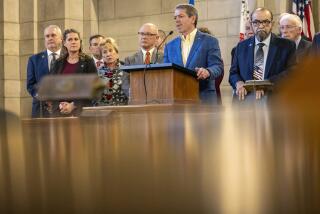POLITICS ’88 : North Dakota Voters Again Reject Lottery
- Share via
North Dakotans rejected a lottery for the second time in 18 months Tuesday, while Virginians chose Democrat L. F. Payne Jr. as their newest congressman.
With 77% of the North Dakota vote in, the lottery was opposed by 41,505 voters, or 59%, and favored by 28,391 voters, or 41%.
“It would seem to me (the vote is) a decisive expression of the will of the people, and I would hope that the proponents would accept the decision of the voters of North Dakota,” former Gov. Arthur Link said.
The lottery was defeated in November, 1986, the first time a state had failed to approve a state-run lottery. Twenty-six states and the District of Columbia have lotteries.
Backers said a lottery would raise $7 million in new revenue for the state, which is struggling through a depressed economy.
Besides the lottery vote, North Dakotans also had the last-in-the-nation presidential primary. But because of its late date no Democrats filed, and on the Republican side the ballot listed only Vice President George Bush and Mary Jane Rachner, a retired teacher who says the spirits of her late mother and grandmother told her to run for President.
With 16 GOP delegates at stake, Bush was piling up 94% of the vote.
In Virginia, Payne, the developer of a ski and golf resort, defeated the Republican candidate, former White House aide Linda Arey, in a special election in the southside 5th District. He succeeds Rep. W. C. (Dan) Daniel, a conservative Democrat who died of a heart attack in January while serving his 10th term.
With all of the votes counted, Payne had 55,406 votes, or 59%, to Arey’s 38,086 votes, or 41%.
Bush Backed Arey
Bush came to campaign for Arey on Sunday in Danville, a textile and tobacco center. Payne stressed his ties to the state’s Democratic Party and received backing from Gov. Gerald L. Baliles.
In Maine’s southern 1st District, Linda Bean-Jones was edged by senatorial aide Edward S. O’Meara for the GOP nomination to oppose Democratic Rep. Joseph E. Brennan, a former two-term governor. With 96% of the vote counted, O’Meara had 15,313 votes, or 52%, and Bean-Jones had 14,102 votes, or 48%.
Bean-Jones, granddaughter of outdoors outfitter L. L. Bean and founder of a defunct conservative publication known as the Maine Paper, tapped her personal wealth for her first political race, spending $455,000 out of her own pocket. O’Meara, a longtime district aide to Sen. William S. Cohen, spent about $60,000.
Bean-Jones stressed her business background as a real estate agent and entrepreneur, contrasting it with O’Meara’s years as a government insider.
South Carolina also had congressional primaries, and in the only challenge to an incumbent, three-term Democratic Rep. Robin Tallon easily turned back retired postal worker Luther Lighty in the 6th District. Tallon was receiving 90% of the vote to Lighty’s 10%.
More to Read
Get the L.A. Times Politics newsletter
Deeply reported insights into legislation, politics and policy from Sacramento, Washington and beyond. In your inbox twice per week.
You may occasionally receive promotional content from the Los Angeles Times.










